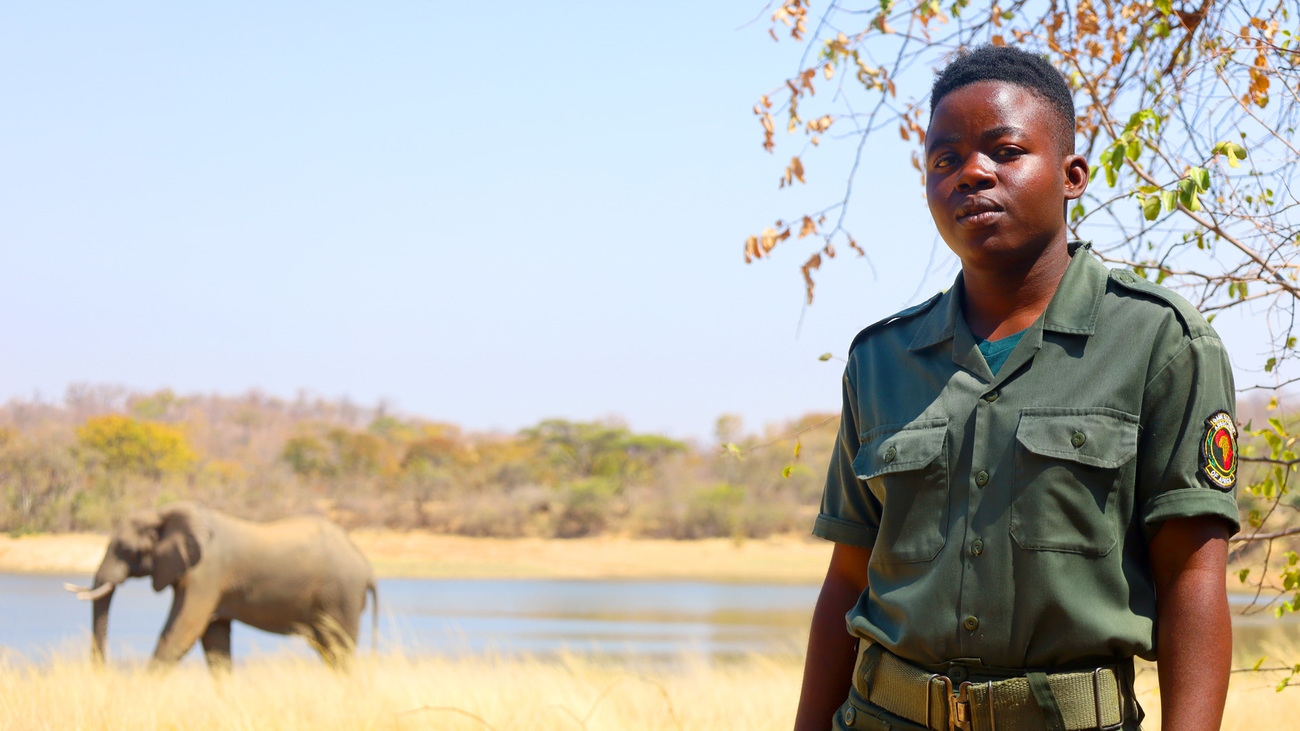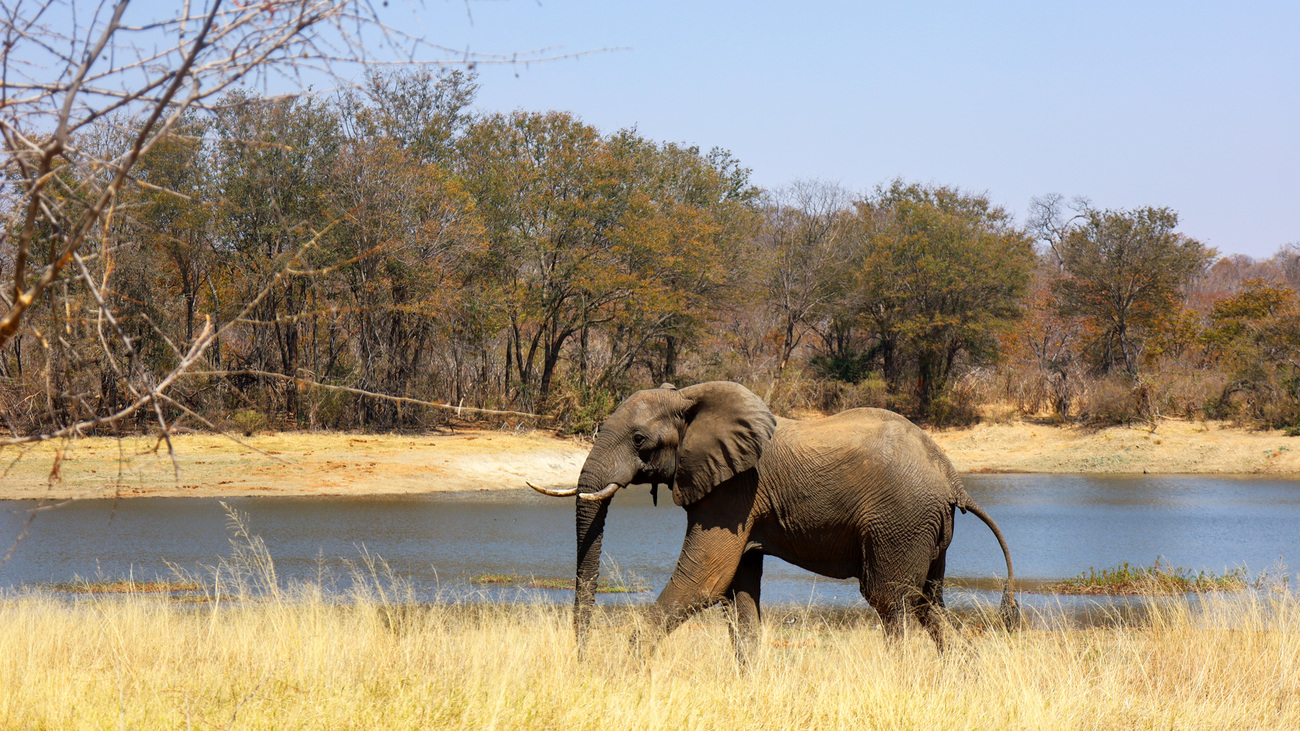Blog
Long’uro: one elephant’s story of immense resilience
Read moreConservation champion Patroness Ncube protects Zimbabwe’s wildlife from brutal wire snares

Skirting the great Kalahari Desert, Hwange National Park is a vast and arid wildlife sanctuary containing one of the world’s largest populations of African savannah elephants.
The 14,645 square-kilometre estate in Zimbabwe is even larger than some countries, such as Northern Ireland. Massive elephant herds and a wide variety of mammals and bird species roam the grasslands with the utmost freedom.
Given Hwange’s mammoth size, the burden of protecting it lies on the shoulders of brave people who put their lives on the line to safeguard the wildlife heritage .
One such person is Patroness Ncube.
The 21-year-old is among the conservation champions on the frontline to protect Hwange’s endangered species from ‘Africa’s silent killers’—brutal and indiscriminate wire snares set by poachers.
Born to a single mother and raised by a maternal grandmother in Senyanga village, a small settlement on the periphery of the iconic park, Ncube was entrusted from an early age with the responsibility of herding her grandmother’s livestock. She is no stranger to encounters with wildlife, even deadly predators. These experiences left her with a big heart, deeply in love with nature, and endeared to animals.
She also has bone-chilling stories to tell. On a sunny afternoon in 2014, the then 12-year-old Ncube and two other youngsters were ‘shade hopping’ from one tree to the other to escape the sun's scorching heat as they looked after their cattle.
Being the most senior, she looked after the cattle and ensured the younger girls were safe.
But, unbeknown to the trio, two sub-adult female lions had been stalking the cattle for some time, waiting for the perfect time to pounce.
‘It was kind of scary because nothing had prepared me for the spine-chilling encounter,’ noted Ncube.
‘As the predator attacked the cows, we had to flee for our dear lives. We had to climb a giant mopane tree to keep ourselves safe from attack,’ she added.
For Ncube, the terrifying incident made her appreciate that survival is for the fittest in Africa's wilderness.
In March 2022, almost eight years after the lion incident, she found herself among the 170 women who applied to take part in the Dete Animal Rescue Trust (DART) selection course, where the top four finalists were guaranteed to join the de-snaring team as full-time wildlife rescuers.
‘I was the youngest of all the applicants, but that did not worry me. Armed with a wealth of knowledge about the wilderness and a profound passion for nature, I was so confident of making it,’ said Ncube.
The one-day selection course, designed to test the candidates' mental and physical resolve, saw the aspiring female wildlife rescuers participating in a series of tests, including general knowledge about wildlife, some energetic physical exercises, and a timed snare sweep on a 100-metre stretch.
‘We made sure that the selection process was as transparent as possible, and those that failed appreciated that it was an honest process,’ said Paul de Montille, DART Programme Director.
‘I’m so delighted that l made my grandmother proud by outscoring 169 women and securing my dream job,’ noted Ncube, who is now part of the DART team responsible for rescuing snared and injured wildlife—large and small—in and around Zimbabwe’s oldest and largest national park.

At the IFAW-supported DART, Ncube’s duties include rescuing and rehabilitating snared and injured wildlife. She also regularly participates in sweeps to monitor the 20-kilometre stretch of the buffer area to remove dangerous wire snares and monitor poachers’ movements.
‘Before establishing the permanent DART base, this section was a poacher’s paradise. There were just too many snares around this place. You could easily find five to 10 snares in less than an hour,’ said Ncube.
‘As a wildlife rescuer, an individual animal matters to me, and every snare removed means another animal saved from death.’
Lauded as a change-maker in the Dete community for defying the odds and pursuing a career in the male-dominated sector, Ncube is optimistic about inspiring her peers to become conservation champions.
‘I consider myself lucky to have this opportunity to contribute to protecting our planet. We owe it to future generations to safeguard the wildlife from the serious threat posed by the brutal wire snares,’ noted Ncube.
‘We are proud to be associated with the amazing and hardworking DART team,’ said Neil Greenwood, IFAW’s Wildlife Rescue Director. ‘Together, we are collaborating to protect wildlife from the brutal and indiscriminate wire snares that seriously threaten the long-term presence of endangered wildlife species in the greater Hwange ecosystem.’
Our work can’t get done without you. Please give what you can to help animals thrive.
Unfortunately, the browser you use is outdated and does not allow you to display the site correctly. Please install any of the modern browsers, for example:
Google Chrome Firefox Safari